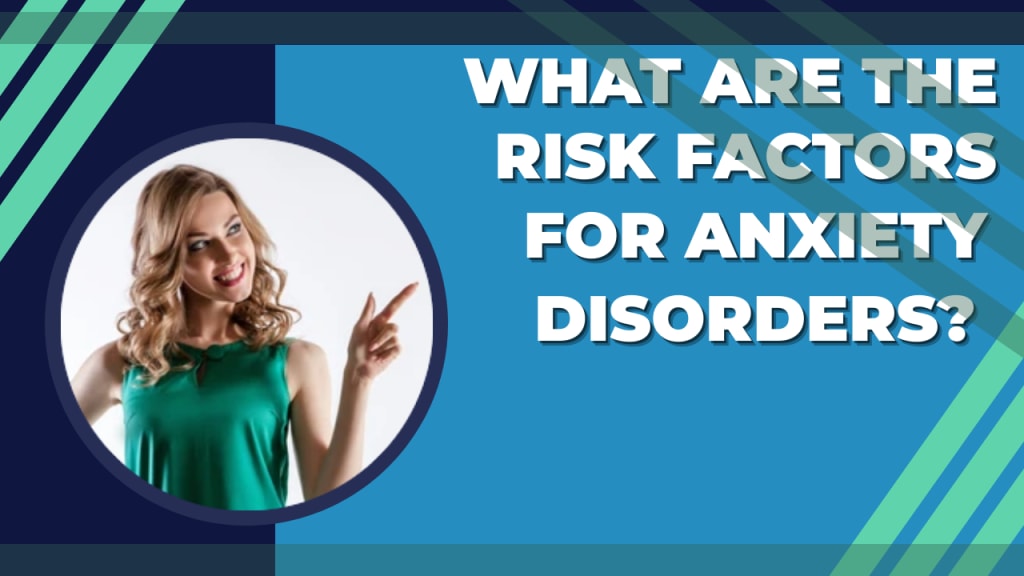What are the risk factors/triggers for anxiety disorders?
Risks and triggers which are connected to anxiety disorders

What is stress?
Everyone experiences some form of stress due to the ups and downs of life. However, if everyday experiences cause intense anxiety and constant worry, you may have an anxiety disorder. In this case, you may experience sudden bouts of anxiety (called panic attacks) that last for several minutes. If you notice symptoms of it please contact doctors right then. Over here at the best addiction treatment center in Murree, we have seen that stressful environments are a common reason for somebody with no stress to start having stress.
Certain things can make you feel more anxious.
Heredity
Family history in terms of anxiety disorder matters because other genes carry the disease with them. This suggests that your genes play at least some role. However, scientists have not found an 'anxiety gene'. So if you have parents or close relatives with an anxiety disorder, it doesn't necessarily mean you will have one too.
In the absence of a parent
If a parent dies before the age of 18, or if the parent is away from home for a long time, the likelihood of anxiety increases. Other family problems such as violence, alcoholism or sexual abuse may also be the cause.
Trauma
The more stressful the event (e.g. violence or sexual abuse) before the age of 21, the more likely it is that anxiety will develop later in life. This can take the form of post-traumatic stress disorder (PTSD). In this case, stressful events return in the form of dreams or disturbing memories. At this time, sweating may occur. You may also experience palpitations. Reach out to your doctor as soon as you can about the situation. They may recommend treatments or medicines. Here at the best addiction treatment center in Murree, we have seen that people with stress easily get into trauma because there is another force inside the body just as strong that is causing problems.
Depression
This is a long period of depressed mood that affects daily life. If your doctor tells you that you are depressed, it is likely that you have some kind of anxiety disorder. If you feel anxious or depressed, consult your doctor. There are treatments available for both these conditions, including psychotherapy and medication.
Self-harm
Teenagers and young adults in their teens and twenties do this a lot, but it is also possible at an older age. It is a way of coping with memories of traumatic events or abuse. They may also cut their hands to distract themselves from their emotional distress. This behaviour has been linked to anxiety and mental illness, such as post-traumatic stress disorder. People who have self-harmed or are thinking about self-harming should consult a doctor.
Constant anxiety
Stressful environments, such as war zones or active workplaces, can cause stress if you stay there too long. Constant worrying about a serious illness, financial problems, work or problems with a loved one can also cause anxiety. In these situations, the following actions can help reduce stress
- Getting out of the house
- Being physically active
- Regular contact with family and the community
- Don't try to help yourself with self-medication consult a doctor
- Personality
- Certain personality traits make people more susceptible to anxiety, for example
- Shy in social situations
- Hypersensitivity to criticism
- Obsessive attention to detail
- Moral rigidity
Sometimes these can be serious enough to be considered a personality disorders. Therapists can help you deal with these problems by using talk therapy and other treatment methods.
Substance abuse
Anxiety disorders are three times more likely to lead to substance and alcohol abuse. Alcohol or drugs can be used to relieve anxiety in uncomfortable social situations. The abuse itself can cause embarrassment, shame, problems in your personal life and other problems that lead to anxiety. Here at the best addiction treatment center in Murree, we have seen that after the use of illegal substances people are prone to get addicted including several mental disorders.
If you suspect that you or a loved one is abusing drugs or alcohol, see a doctor.
Loneliness Loneliness is not necessarily a bad thing. And it is normal to feel lonely after losing a loved one. However, feeling cut off from the world for too long can lead to or worsen anxiety and depression. This can lead to further isolation and start a terrible cycle.
Find ways to connect with friends, neighbours and loved ones regularly. If you still feel isolated, see a doctor.
Physical discomfort
- Anxiety can sometimes be the first sign of another problem. These include.
- Heart disease
- Diabetes mellitus
- Thyroid disorders, such as hyperthyroidism
- Chronic obstructive pulmonary disease (COPD)
- Asthma
- Drug withdrawal






Comments
There are no comments for this story
Be the first to respond and start the conversation.